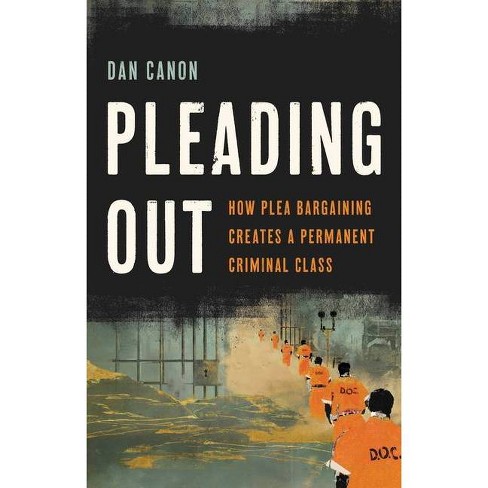American society has become so over-criminalized that, according to the Institute for Policy Studies, the average working adult in this country unintentionally commits an average of three felonies a day. This nation’s obsession with prosecuting and incarcerating millions of its citizens is well known, and many efforts to explain the root cause of the problem center on the War on Drugs or systemic racism.
In Pleading Out: How Plea Bargaining Creates a Permanent Criminal Class, civil rights attorney David Canon explores the historic trends and efforts to subjugate the working class that led to the prominence of plea bargaining — a system responsible for resolving 97% of current cases.
Canon opens with a colorful account of the 1972 arrest of Paul Lewis Hayes, a Black man who had the misfortune of trying to cash a forged check a friend had given him.
“The leaves had turned their final shades of rust and yellow,” Canon writes. “The air was clean and cold in the city, not cold enough to herd people into heavy coats but the kind that chills the lungs enough to sharpen the senses.”
An off-duty police officer caught Hayes in the act, and a Kentucky prosecutor subsequently offered Hayes a five-year prison sentence in exchange for pleading guilty to trying to cash the $88 check. Hayes refused and asked for a trial. The prosecutor, outraged, took Hayes before a grand jury that found him guilty. Sentencing laws in Kentucky at the time mandated life behind bars.
Canon uses the account to describe how the system of taking deals from prosecutors was ingrained in the criminal justice system by the time of Hayes’ arrest in 1972. “For as long as any of [my fellow attorneys] can remember, we have been taught that plea bargaining is the way to manage crime, so we don’t question it,” Canon writes.
Until the 1830s, Canon writes, jury trials were the norm and plea bargaining was nonexistent. Courts at the time would even go to great lengths to sway defendants from pleading guilty without a jury trial.
“Massachusetts was the fertile crescent of plea bargaining,” Canon writes early on in the book. “We don’t know much about the genesis of the practice per se, but we do have records of the raw number of guilty pleas in Boston. Throughout the 1830s, this number increased dramatically, suggesting that defendants had an incentive to plead that wasn’t there before.”
The practice of legal bargaining spread quickly across the United States, partly as a means of dealing with new criminal laws that targeted working-class Americans who were demanding better pay and reasonable work hours. Courts outlawed organized labor groups, and courts began issuing opinions saying the rule of law condemns efforts by workmen to have their wages raised.
“The idea of a limited jury was instantly popular among upper-class professionals of the 1800s because they recognized that the jury had become too democratic and therefore too dangerous,” part of Chapter 3 reads.
Canon highlights one 1840 case, Commonwealth v. Hunt, that demonstrated how easily unions could be targeted for prosecution. A disgruntled former union member of the Boston Journeyman Bootmaker’s Society sought to have his one-time bosses charged with criminal conspiracy. Boston’s district attorney placed the union’s eight leaders on trial as a result and prosecuted them even though the disgruntled former union member presented no evidence that his removal from the society had caused him harm. The trial judge told the jury to find the eight men guilty, and the jury complied.
The growth of federal law enforcement efforts under FBI director Herbert Hoover and the Eighteenth Amendment that outlawed the manufacture and sale of intoxicating spirits led to an explosion of incarceration rates in federal prisons — more than tripling that population between 1920 and 1933.
The courts, Canon writes, made no meaningful effort to check Congress’ desire to make serial offenders of us all. The rise of the so-called criminal class, which was supported by the plea bargaining system, targeted the poor.
“If you’re a cop who needs to arrest as many people as possible every day, a good place to be is the poorest part of town,” Canon writes. “That’s not to say that poor people commit more crime than their suburban counterparts. The arrestees harvested from the poorest communities are the easiest prey for officers who need to meet quotas.”
An explosion of new criminal laws throughout the 20th century created a cycle in which complicit prosecutors, judges, and law enforcement relied on bad policing (coercive interrogations, frame-ups, threats), malicious prosecutors, and an over-reliance on eyewitness testimony and informants to incarcerate millions of largely poor Americans.
Canon ends his book by offering several theoretical fixes to this country’s obsession with plea bargaining.
“Putting together a big group of concerned citizens is more effective than electing a conscientious prosecutor,” he writes. “A critical mass of people in a discrete geographic area who are paying attention to plea bargaining practices can put pressure not just on one elected prosecutor but on their successors as well.”
Throughout Pleading Out, Canon builds his case like the well-tuned lawyer he is. His scathing critique of America’s criminal justice system takes a fresh approach that makes little mention of slavery and Jim Crow, most likely because those areas are now well-researched. The efforts of elites in the 1800s to maintain economic supremacy over this country led to a criminal justice system that now incarcerates on an unprecedented scale as a means of justifying the carceral system that employs millions of Americans as law enforcement, judges, and prosecutors.
In closing, Canon tells his readers that we should resist the idea that defendants have to plead to something no matter how ridiculous the charges. Any step that diminishes the power of prosecutorial bargaining, he argues, restores power to the citizens of this country.
“It’s a long shot but one worth trying,” he writes.
Pleading Out
By Dan Canon
Basic Books
$30












